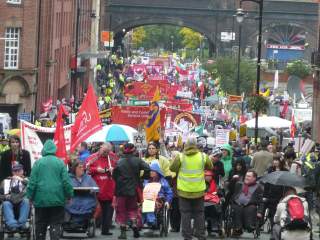On Sunday October 3rd the – at times – torrential
rain could not dampen the enthusiasm of around 7,000 marchers as they wound
their way through Birmingham city centre in protest against Tory/Lib Dem
government’s planned cuts. As Mark Serwotka, PCS General Secretary,
said speaking from the rally platform, ”If thousands could be mobilised against
the cuts in the pouring rain, just think what could be achieved if the TUC were
to organise such a demonstration. We could bring hundreds of thousands onto the
streets.” He then called for all on the march to go back to their trade unions
and fight in them to get the TUC to call national action against the cuts.
On the march there were trade union banners in plenty
from branches and regions up and down the country. The range was impressive –
CWU, PCS, PoA, Unison, Unite, NUJ, UCU, GMB, TSSA, RMT, NUS, as well as Trades
Councils and Labour Parties. They all came to demand that action be taken by
the labour movement to oppose the cuts package that will target the poor to pay
for the crisis of capitalism. Demands from speakers for a general strike were
greeted with enthusiasm. But the overall message of the marchers was that
working class people should not pay for a crisis caused by the bankers and
their system.
Promises were made to support workers in struggle to defend
jobs and services even if such action is illegal under the anti-trade unions
laws. If these promises are carried out in practice, we will witness in the
coming period a mounting wave of industrial action as working people are forced
by events to take measures to defend the gains they have made through struggle
over past decades. All of this action must be supported by the labour and
trade union movement at all levels. If it is not, then the struggles of past
generations of workers will be nullified as the gains of the past are swept
away. With this crisis of capitalism nothing is guaranteed.
However, the struggle must also be political. We know that
one of the main causes of the present crisis was the banking and credit system
where loans were made with money that the banks did not possess. They created
money, what Marx called fictitious capital, to lend to people who had no hope
of paying it back. The explosion of lending provoked an inflationary spiral in
the housing market that left millions of working people squeezed out of ever
being able to buy a house. When the system collapsed, the banks came crawling
to the Labour Government for handouts to save their system.
The banks were bailed out with £850 billions of public money
and the resulting government debt created uncertainty in the money markets
which then demanded government cuts to balance the books. The idea promoted by
many speakers on the march that the cuts are “ideologically driven” is
misleading. The need to save capitalism for the rich is driving the cuts
package. It is not ideology that determines the policy but the reality of the
crisis of capitalism. If ideology were to blame, it would foster the belief
that all that as needed was to change the ideology.
What is in fact
needed is a bold programme of socialist measures to put an end to the system of
capitalism so that the wealth that is created by working people is owned and
controlled by the whole of society. Only then can we begin to prepare a
democratically decided plan to use that wealth to build homes, hospitals,
schools and public services. We can use material resources to raise living
standards, create jobs and remove fear and want. In this way too we can remove
the material base for the rise of organisations such as the EDL and other proto
fascist groups that seek to exploit the unsatisfied real needs that many
working class people have in order to drive wedges based on skin colour between
different sections of the working class.
To create such a plan would require as a minimum the taking
of the whole of the banking and financial system into public ownership with
compensation based on proven need. This would provide the material and
financial basis for the development of a plan of production to increase the
material wealth of society. That would be the first stage of transforming
capitalism into socialism. Without state ownership of banking and finance we
will not be able to take the first steps to put an end to the crisis of
capitalism. This is the political solution which along with the industrial
battles we will be witnessing will herald the start of a new era for humanity.






